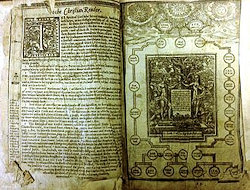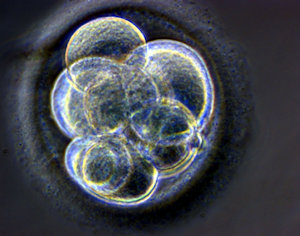Most Christians believe in something called a human soul that survives death. The questions of when and how a person obtains that soul, whatever it is, have been discussed and debated throughout Christian history. It is no different today, especially for those who are trying to determine abortion law. Although atheists don’t believe in God, they will certainly use the Bible for reference, if its scripture can be twisted to their advantage. Even using the same book, Christians find a way to prove or disprove God’s acceptance of abortion, depending upon their own agenda.
This study is not presented to convince anyone to switch sides on this hotly debated subject, but only to accurately understand God’s word. But since the subject of abortion is very important in our world today, our discussion will include some issues on that topic, too. We will answer the questions posed in the title of this article, but in doing so, we will raise another of which I have no answer, as you will see.
The words ‘spirit’ and ‘soul’ are commonly used interchangeably and I completely understand that people, as well as literature (especially older commentaries referencing the KJV), use the word ‘soul’ when they are really referring to God’s spirit given to humans at birth. In fact, I’m now in the habit of just assuming someone is speaking about the ‘spirit’ when they ask me questions about the soul. But in order to answer the questions raised here, we must understand the true meaning of those words, or we may never truly understand what God actually means.
 These terms are confusing because of mistranslations from long ago, first in the Latin Vulgate and then the later King James version of the Bible. The Latin Vulgate (used since the 4th century) and the English King James Version (used since 1604),1 were the most utilized texts for Christian teaching. Most errors have been corrected in modern times, as scholars reexamined the original languages and corrected the translation mistakes. Because of an early mistranslation, the term ‘soul’ became confused with God’s ‘spirit’ and this error can be discerned early in the Bible, in Genesis, chapter two.
These terms are confusing because of mistranslations from long ago, first in the Latin Vulgate and then the later King James version of the Bible. The Latin Vulgate (used since the 4th century) and the English King James Version (used since 1604),1 were the most utilized texts for Christian teaching. Most errors have been corrected in modern times, as scholars reexamined the original languages and corrected the translation mistakes. Because of an early mistranslation, the term ‘soul’ became confused with God’s ‘spirit’ and this error can be discerned early in the Bible, in Genesis, chapter two.
In the King James Version, it is stated: “And the LORD God formed man of the dust of the ground, and breathed into his nostrils the breath of life; and man became a living soul” (Genesis 2:7, KJV). Notice that the last word in that quote is ‘soul’; I have underlined it for emphasis. Whereas the New Revised Standard Version ends that verse this way, “. . . and the man became a living being” (Genesis 2:7, NRSV). Other versions translate that last word in verse seven as: creature (ESV), or person (NLT). So, in this case, soul means the whole person, or whole being, or the whole human creature.
Keep in mind that the term ‘immortal soul’ is not in the Old Testament, nor the New Testament of the Bible, so the soul is not the everlasting spirit imparted to humankind. Then, what is the spirit within humankind, if not a soul? The phrase “breath of life” broadly means “to animate life, which was naturally shown by breathing,” and when breathed by God, it is a description that is only used in the Bible for humans, never animals. This describes humans receiving a spirit in the image of God2 as well as causing the human to become alive. So, the spirit is that spark of life, breathed in by God at birth, which makes this creature a human being with God’s attributes — in God’s image.
 The Hebrew word נֶפֶש, nephesh,3 although translated as ‘soul’ in many older English Bibles, actually has a meaning closer to ‘living being’.4 The soul is really the whole creature (animated body) of an animal or human, whereas the spirit is bestowed by God to make us a person in his image. It is that unique attribute that resides only within the whole human being, but returns to God upon our death. The soul is a visible thing, but the spirit is not visible and not a physical thing, wisp, essence, or ghost — it is an attribute of God; it is a Godly sentient consciousness that only we have.
The Hebrew word נֶפֶש, nephesh,3 although translated as ‘soul’ in many older English Bibles, actually has a meaning closer to ‘living being’.4 The soul is really the whole creature (animated body) of an animal or human, whereas the spirit is bestowed by God to make us a person in his image. It is that unique attribute that resides only within the whole human being, but returns to God upon our death. The soul is a visible thing, but the spirit is not visible and not a physical thing, wisp, essence, or ghost — it is an attribute of God; it is a Godly sentient consciousness that only we have.
This was explained very well by Solomon when he was writing about old age and death. He said to remember that we are really God’s property and the spirit he gave us, survives the body.5 “. . . the dust returns to the earth as it was, and the spirit returns to God who gave it” (Ecclesiastes 12:7, ESV). If you wish to know more about this spirit and soul confusion, see a previous treatise published on this site, listed at the end of this article.6
How does this effect our original questions?
Concerning our original questions, here lies a problem — should we ask “when and how do we become a living soul” or “when and how do we receive the special spirit of God that makes us in his image and gives us not only breath, but the potential of having eternal life?” Our spirit is not destroyed upon our death, but our lifeless soul decays into dust.
 The human embryo, that rudimentary organism in the early stages of growth, is definitely a growing entity, and completely dependent upon its mother, but does it have God’s spirit?
The human embryo, that rudimentary organism in the early stages of growth, is definitely a growing entity, and completely dependent upon its mother, but does it have God’s spirit?
This thought is continually debated. Some suggest no, not until it is born. Others believe yes, a fetus does have God’s spirit because it is received when the initial fetal heartbeat begins within the mother’s womb. I believe it is reasonable to believe the child has God’s spirit well before birth. When a baby receives that godly spark, that is when it receives a spiritual life.
In explaining how could ‘breath’ be related to ‘heartbeat’, one must understand that humankind didn’t have knowledge of anatomy or any science, that far back in time. The description of breath as an invisible life force probably seemed reasonable.
Animals also have breath, but “human beings have the very spark of God sustaining them. Michelangelo powerfully depicted this scene with God’s mighty finger reaching to touch the man’s flaccid and lifeless hand. Humans have been given God’s life.”7 The record of the birth of humankind tells us that “it was only to man that God directly ‘breathed’ in the ‘breath of life’.”8
Finally, according to Genesis 2:7, the combining of the physical body and the divine breath produces the independent “living being.” This expression is often translated ‘living soul’, because the Hebrews could not think in terms of a soul apart from the body; to them the whole body was the soul. Think of the term “he was a merry old soul” or “oh, that poor soul,” they describe the whole unit, not some floating wisp or substance that escapes when the body dies. “Like the animals, man is a living, breathing being; unlike the animals, however, he arrived at that state in a way that assuredly distinguishes him from the animals.”9 Humans are born a higher creature than animals and have, within them, God’s spirit.
A scholar writing in a biblical dictionary said that throughout the Bible, ‘soul’ is “simply the equivalent of ‘life’ embodied in living creatures. In the earlier usage of the O.T. it has no reference to the later philosophical meaning — the animating principle, [and] still less to the idea of an ‘immaterial nature’ which will survive the body. ‘A living soul’ in Genesis and other records is simply an ‘animated being,’ and the word is applied equally to the lower animals and to man.”10
Is an unborn person of less value than one already born?
Does this mean that the human fetus, without the spirit of God within it, is of less value than a living person, who has received that spirit? ‘Pro-choice’ crusaders will say, “Yes, that is true!” Then they quote the following from the book of Exodus as evidence of God’s position. “When people who are fighting injure a pregnant woman so that there is a miscarriage, and yet no further harm follows, the one responsible shall be fined what the woman’s husband demands, paying as much as the judges determine. If any harm follows, then you shall give life for life, eye for eye, tooth for tooth, hand for hand, foot for foot, burn for burn, wound for wound, stripe for stripe” (Exodus 21:22-25, NRSV).
 This translation seems to support the pro-choice conclusion that an unborn person is not as worthy of protection as is an adult.11 Basically, the pro-choice argument contends “that if the child dies, but the woman is okay, then there is only a small fine. If, however, the woman is injured, then there is a serious penalty. This, they contend, shows that . . . the unborn child [is] something less. They further argue that this demonstrates that the Bible is largely unconcerned with the life of an unborn child.” But, as we will see, “the evidence of language, context, and history all point together to the fact that this passage upholds the value of unborn human life and provides grounds to condemn abortion.”12
This translation seems to support the pro-choice conclusion that an unborn person is not as worthy of protection as is an adult.11 Basically, the pro-choice argument contends “that if the child dies, but the woman is okay, then there is only a small fine. If, however, the woman is injured, then there is a serious penalty. This, they contend, shows that . . . the unborn child [is] something less. They further argue that this demonstrates that the Bible is largely unconcerned with the life of an unborn child.” But, as we will see, “the evidence of language, context, and history all point together to the fact that this passage upholds the value of unborn human life and provides grounds to condemn abortion.”12
When you examine different translations, you will find that most Bible versions present that quoted situation above a bit differently. Instead of hitting the woman “so there is a miscarriage,” as the New Revised Standard Version states, the New Living Translation says, “so she gives birth prematurely;” the English Standard Version states, “so that her children come out;” the 1900 King James Version says, “so that her fruit depart from her.”
In other words, the correct interpretation indicates that if the child comes out alive (birth) and God’s breath (spirit) has been breathed into him/her, but no other injury has occurred to the child or mother, then there is no large penalty. But if the baby is dead (abortion/fetal death), or the child or mother is injured, than there is a serious penalty. An OBS article is available for further study on this subject and listed under ‘References & Notes’.13
All this demonstrates that the Bible does show the unborn baby has the same value as a living human. But it does raise another question. The baby born prematurely, but alive and breathing, would have God’s spirit and the possibility of eternal life, but is that same option available to the dead fetus which never received that spirit? In that case, the spirit cannot be returned to God for a future resurrection, if it was never given in the first place.
What did the Church fathers say about abortion?
 Although the Christian Church has been against abortion from the earliest day, many pro-life people use one of the Church’s greatest theologians, Thomas Aquinas, to support abortion. One of his statements was even used in the famous Roe vs. Wade landmark decision of the U.S. Supreme Court.14
Although the Christian Church has been against abortion from the earliest day, many pro-life people use one of the Church’s greatest theologians, Thomas Aquinas, to support abortion. One of his statements was even used in the famous Roe vs. Wade landmark decision of the U.S. Supreme Court.14
The quote specifies that God created the rational human soul in the body sometime after conception, some 40 days for males and 80 days for females, so early abortion, according to Aquinas (they say), would not be murder, because what was being killed was not yet human. How these times were figured is interesting as well as complicated, but it is too long an explanation for this article. Aquinas would probably be offended that his statement was used in such a way.
Although used a lot, most writers do not research this supposed Aquinas quote, because if they did, it would be actually cited as a quote copied from Aristotle.15 “Natural science at that time was often more akin to what is more narrowly defined as philosophy today. Empirical data was lacking, and so the timing of ‘ensoulment’ (the coming to be of the rational soul in a body) was based on simple observations”16 and Aquinas was merely quoting Aristotle.
Aristotelian theology was metaphysical; he was neither proficient nor versed in God’s word and didn’t know the fine religious difference between soul and spirit. But that didn’t keep others from accepting his concepts, which were affirmed by many later Jewish, Christian, and Islamic philosophers.17
Our soul (our body) dies and turns to dust, but our Spirit returns to God for safe keeping. This Spirit, properly kept intact in a type of suspended consciousness,18 will be returned to us in a new body on earth, in a coming new world created by Jesus. What about the spirit of an unborn child who, by way of abortion, accident, or disease, did not have the opportunity to receive God’s spirit — where is it? At this point, I don’t know. Maybe God, in his infinite wisdom and love, places it in safe keeping, to be delivered for the first time in the future kingdom of God on earth. I would appreciate your thoughts and comments.
![]()
Copyright © 2019, Dr. Ray Hermann
OutlawBibleStudent.org
→ Leave comments at the end, after References & Notes.
OBS respects your privacy and is also compliant with the European Union GDPR regulation.
References & Notes
- Note: The King James Version (KJV), also known as Authorized Version (AV), is an English translation of the Christian Bible for the Church of England published in 1611 under the sponsorship of King James VI. This translation supplanted the Latin Vulgate, a 4th century Latin translation used for over a thousand years.
“King James Version,” (Wikipedia, Wikimedia Foundation, Inc., 26 October 2019), https://en.wikipedia.org/wiki/King_James_Version - Barry, John D., et al., Faithlife Study Bible, (Bellingham, WA: Lexham Press, 2012, 2016), Genesis 2:7.
- Note: The word nephesh occurs 754 times in the Hebrew Old Testament. In the AV and RV it is translated “soul” 472 times, while in the other 282 places it is represented by forty-four different words or phrases. In fifty-three of these places there is a marginal rendering which calls attention to the fact that the word is “nephesh”, while in 229 passages the English reader has hitherto been left in ignorance of the fact.
“Nephesh,” in The Companion Bible, Appendix 13, (Ecclesia Truth, retrieved 30 September 2019), http://www.ecclesia.org/truth/nephesh.html - “Soul in the Bible,” (Wikipedia, Wikimedia Foundation, Inc., 8 August 2019), https://en.wikipedia.org/wiki/Soul_in_the_Bible
- Jamieson, Robert, et al., Commentary Critical and Explanatory on the Whole Bible, (Oak Harbor, WA: Logos Research Systems, Inc., 1997), vol. 1, p. 413.
- “What is the Soul: is it a Spirit or something else?” (The Outlaw Bible Student, OBS, 26 February 2019), https://outlawbiblestudent.org/what-is-the-soul-is-it-a-spirit-or-something-else/
- Waltke, Bruce K. and Fredricks, Cathi J., Genesis: A Commentary, (Grand Rapids, MI: Zondervan, 2001), p. 85.
- Morris, Henry M., The Genesis Record: A Scientific and Devotional Commentary on the Book of Beginnings, (Grand Rapids, MI: Baker Books, 1976), p. 86.
- Ross, Allen P., Creation and Blessing: A Guide to the Study and Exposition of Genesis, (Grand Rapids, MI: Baker Books, 1998), p. 123.
- Laidlaw, John, “SOUL,” (Ed.) James Hastings, et al., A Dictionary of the Bible: Dealing with Its Language, Literature, and Contents Including the Biblical Theology, (New York; Edinburgh: Charles Scribner’s Sons; T. & T. Clark, 1911–1912), p. 608.
- Piper, John, “The Misuse of Exodus 21:22-25 by Pro-Choice Advocates,” (Desiring God, 8 February 1989), https://www.desiringgod.org/articles/the-misuse-of-exodus-2122-25-by-pro-choice-advocates
- Wayne, Luke, “Does Exodus 21:22-25 justify abortion?” (Christian Apologetics & Research Ministry, CARM, 10/24/2016), https://carm.org/does-exodus-21-22-25-justify-abotion
- “Exodus 21:22-25, Pro-choice or Pro-life – Is a Fetus Valued Less Than a Person?” (The Outlaw Bible Student, OBS, 1 April 2018), https://outlawbiblestudent.org/exodus-2122-25-pro-choice-or-pro-life-is-a-fetus-valued-less-than-a-person/
- Note: ROE v. WADE, 410 U.S. 113 (1973): IV.3 – this decision ruled that the Constitution of the United States protects a pregnant woman’s liberty to choose to have an abortion without excessive government restriction.
- Aristotle, The History of Animals, (350 BC), Book VII, Part 3, (available for download from M.I.T. Classics Achive), http://classics.mit.edu/Aristotle/history_anim.7.vii.html
- Beaumont, Douglas, “Aquinas on Abortion,” (Douglas Beaumont Theology, Philosophy, Apologentics, 1 March 2012), https://douglasbeaumont.com/2012/03/01/aquinas-on-abortion/
- “Aristotelian theology,” (Wikipedia, Wikimedia Foundation, Inc., 7 September 2019), https://en.wikipedia.org/wiki/Aristotelian_theology
- Note: suspended consciousness – temporary cessation of activity; a limited loss of consciousness resembling death.

I don’t think the Bible is clear on when “the LORD . . . forms the spirit of man within him” (Zech. 12:1). However, “within him” would hardly apply to a fertilized egg, or even an embryo that lacks a body.
Eva’s comment about pottery is apropos. The Bible depicts God as the potter and human beings as the clay (cf. Isa. 45:9; 64:8; Jer. 18:2-6; 22:28; Rom. 9:20-23). It seems to me that God is forming human beings in the womb to make them His image between conception and birth (as John the Baptist illustrates in Luke 1:41-42).
Thank you for sharing your opinion.
Perhaps an unborn soul is like as an unfired clay vessel. The clay can be moistened and remolded or reworked. Logically, it is potential energy.
Thank you for your unique thought. I like the way you think.
The breath of life statements are interesting because people do disagree when life begins. It seems to me that in Genesis chp 2 verse 7 the breath of Life that God imparts to Adam is a bit different than human beings being born and I say this because Adam was created from the dust – the first ever human. There was no male and female sexual joining to create humans in the creation week. So God literally breathed into Adam and brought him to life.
This was the first and last way that it was done. I say this because God did breath life into Eve – Yet she was created from a bone from Adam (not directly from the dust of the ground)- but that is getting into nit picky points here! So – humans now are created differently than when God did it with Adam – it is now the joining of male sperm and female egg. So the argument that the baby has no spirit till taking the first breath outside the womb makes no sense because the baby is alive and growing in the womb are they not? Is the baby inanimate/dead/not alive upon delivery and then miraculously took a breath and started living? Nope. And anyone foolish enough to argue that point has never seen the size of a womans abdomen change as the baby grows to maturity.
Adam was “not alive” and then “was alive” after Gods breath. The baby is conceived and grows in the womb, so I would contend that when the sperm and egg come together, God decides this one will be and this is the breath that animates them. I have heard some people argue for abortion up to birth – which would mean it is allowable to kill them right up until the very moment they take their first breath – because they are not human and have no spirit until that happens………..YIKES. And I never hear the argument about not being of “that kind” when used with anything else – EVER: be it insect, bird, reptile etc. Do you ever heard it stated – in the belly of a whale it is a human – until it is born and then it is a baby whale!
I mean seriously – if it is not a human baby growing in the mothers womb, what is it? An insect, a reptile and then POOF – as soon as it’s born it becomes a human? Now that’s some kind of feat of creation! There are some who say “the thing inside a womans womb is a parasite not a human” – I would argue then that they remain a parasite their whole life because a parasite is dependent upon the host for survival, and are we not dependent on our parents until usually age 18 or so and I would also state that some never leave…so they are parasites forever!
Another point – I think we have to be WAY careful of taking the “Church Fathers” words as gospel or worthy of elevation. Why? Because a lot of them were very influenced by many different kinds of pagan beliefs and/or philosophies – as you stated in your article above about Aristotle’s influence on Aquinas. They took those beliefs, mixed them with Christian beliefs and before you know it you have the Roman Catholic church offering you the option of buying your family member out of purgatory or sustaining the belief that Satan and his demon angels are going to live forever – sin and death are never destroyed – oops sorry, Jesus death didn’t accomplish what you thought!! What a world.
Thank you for your comment about this article. I appreciate that you took the time to add your thoughts.